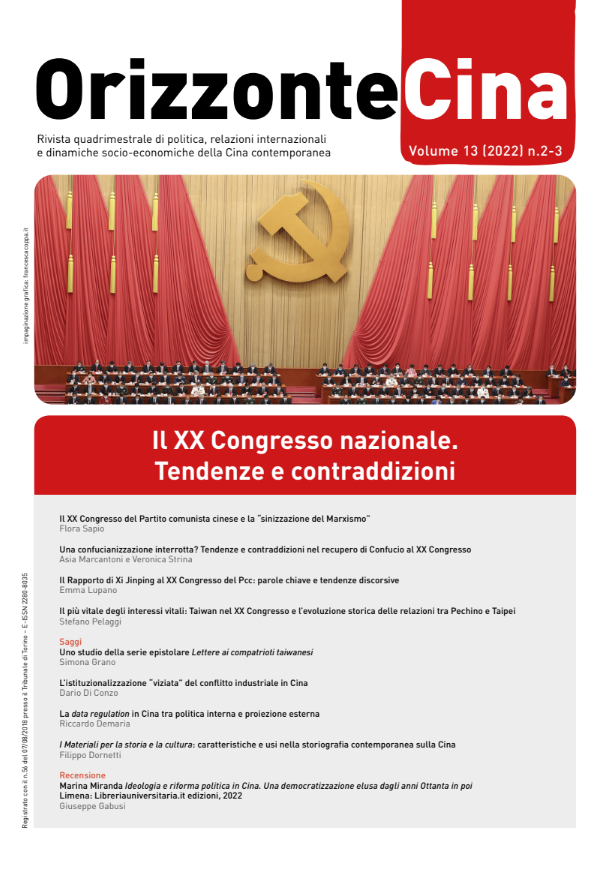Vol. 13 No. 2-3 (2022): The 20th National Congress. Trends and Contradictions

The 20th National Congress of the Chinese Communist Party marked Xi Jinping's plenitudo potestatis. Confirmed as General Secretary for an unusual third term and surrounded by loyalists in the Standing Committee, Xi now appears to be embodying China's return to the old era of the paramount leader. The complex events of the past three years - ranging from the mounting tensions with the United States to the persisting state of pandemic emergency - do not appear, therefore, to have undermined the tendency towards the centralisation of power that has marked the 'New Era', since it was inaugurated in 2012. On the contrary international tensions and the internal state of emergency offered new leverages for centralisation. This is suggested by the ubiquitous reference to a spirit of 'struggle' (dòuzhēng 斗争), drawing the essential need to preserve the centrality of the leader from the image of a hostile external environment. In this sense, the joint visit of the newly formed Standing Committee to Yan'an is highly symbolic. It ostentatiously draws parallels between the recently concluded 20th Congress and the 7th Congress celebrated there in 1945, and by implication between Xi's and Mao's leadership. However, the objectively difficult environment creates new contradictions in the march towards the "great renaissance of the Chinese nation" (Zhōnghuá mínzú wěidà fùxīng 中华民族伟大复兴). Having accomplished the first 'goal of the century' along with the 100th anniversary of the Party's founding in 2021, it now remains to achieve the second goal: an articulated declination of the concept of 'Chinese-style modernisation' (Zhōnguó shì xiàndàihuà 中国式现代化), which is at risk of being severely affected by the slowdown of the Chinese and international economies, as well as the social tensions produced by the pandemic containment policies. Equally uncertain seem the ambitious goals of technological progress, especially in light of the additional sanctions recently imposed by Washington on exports to China. Not to mention concerns over the "most vital of all vital interests" – Taiwan. Whereas only a few years ago the ultimate goal of national reunification seemed achievable with ever closer economic integration, the island is now at the epicentre of international tensions that demand new strategic assessment. Similarly, new scrutiny is required over the reform of global governance to Beijing’s preferences, and endeavour increasingly affected by the growing competitiveness of the international environment and polarisation produced by the war in Ukraine. On these and other matters, the Congress documents provide small adjustments in the 'formulations' (tífǎ 提法), which perhaps foreshadow more significant policy changes.

